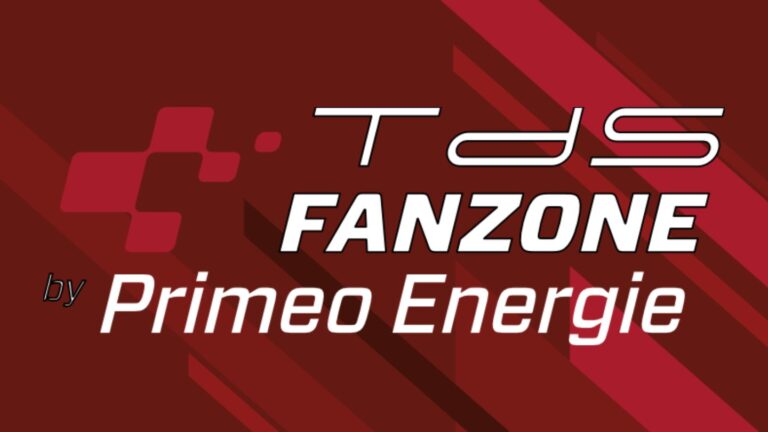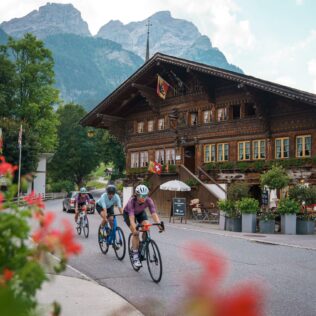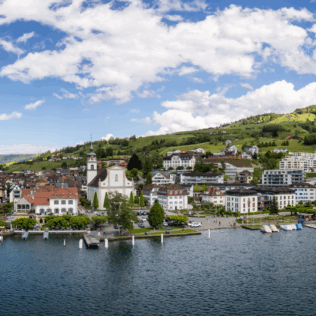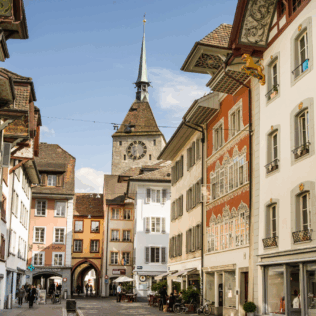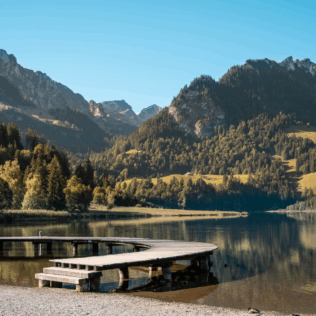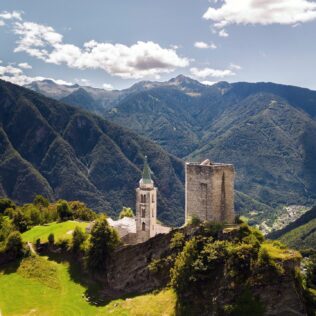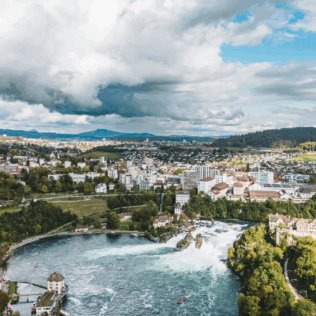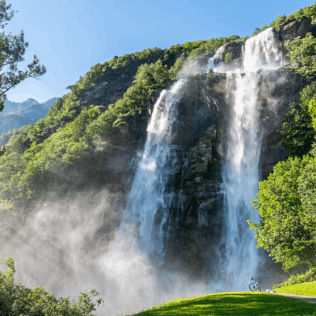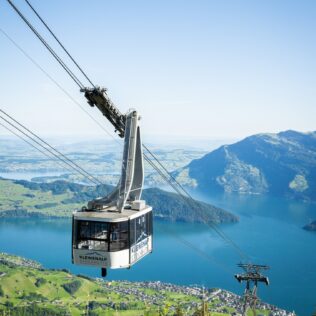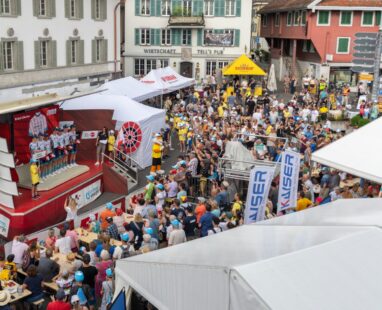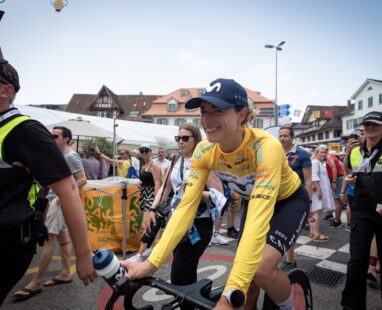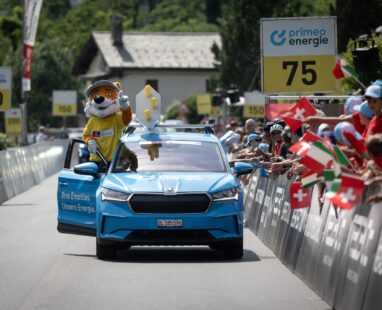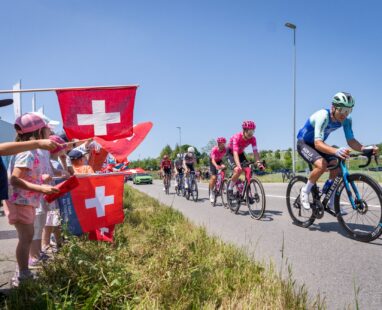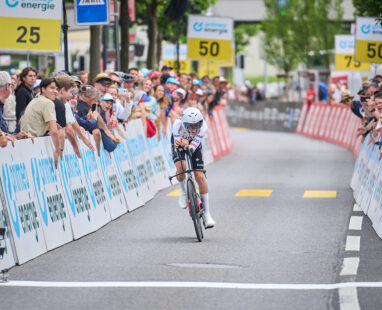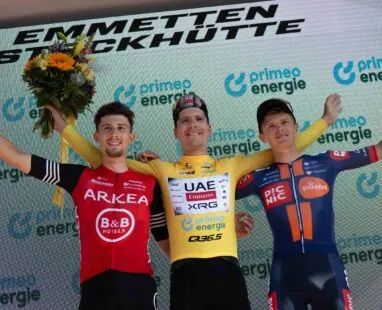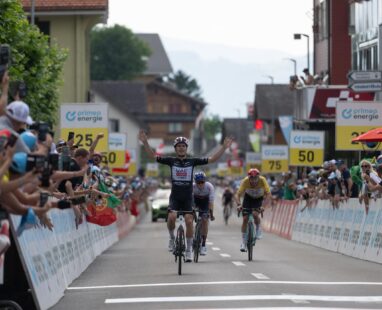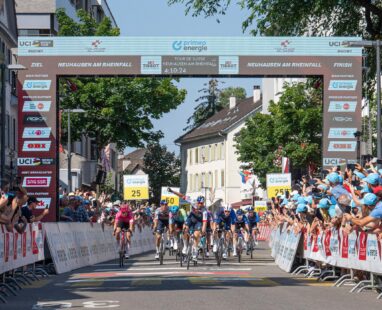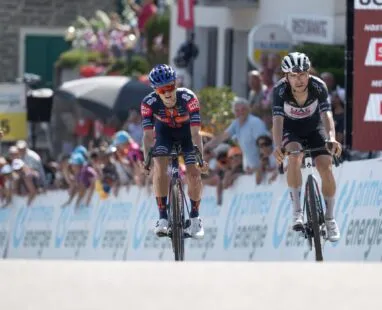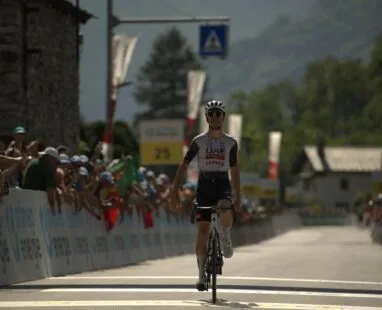Starting on June 12th the Tour de Suisse 2025 again welcomes Primeo Energie as its main sponsor. We spoke to Tour Director Olivier Senn in advance about the national tour, the issue of safety, top sporting performances and what sustainability means for the organisers.
Olivier Senn, this year’s Tour de Suisse kicks off on June 12th. How are preparations going?
Currently we are right on schedule. There had been slight delays with two Host Cities finalised a little later than usual. But everything is now going as planned and we are finishing off the last details.
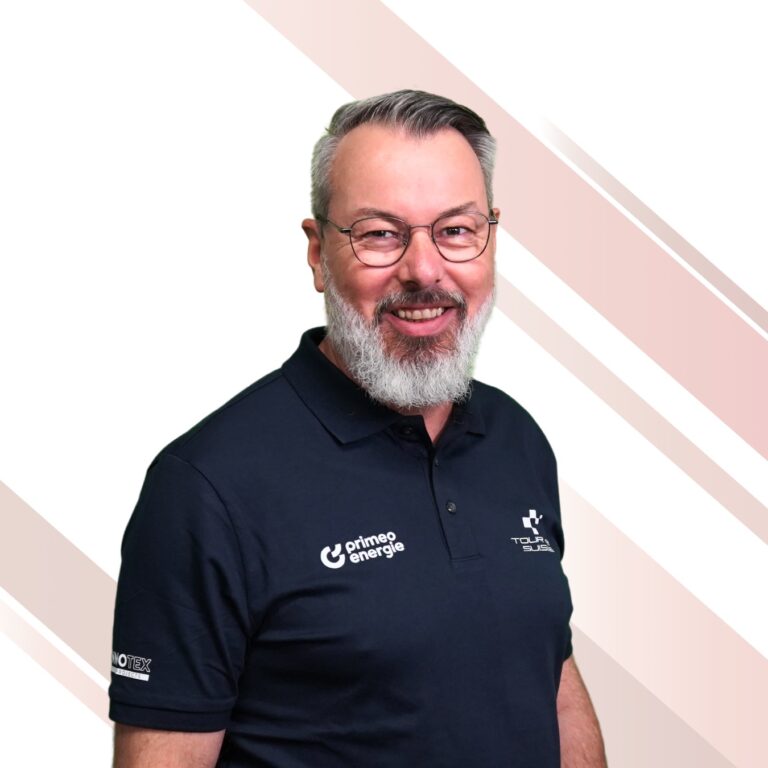
The long-standing Tour de Suisse Director, Olivier Senn
Following the tragic deaths of Gino Mäder and Muriel Furrer, the focus on safety is greater than ever. What new measures have you taken to further improve safety?
We are taking various precautions. Firstly, we are now having our safety measures reviewed by external experts – including the safety officer from Primeo Energie. These experts analyse our documents and processes from an independent perspective. That helps us a lot. Secondly, we have reorganized the risk analysis of the route. In the past, one or sometimes two people were responsible for this. Today it is a team of five experts. They study every stage, identify potential danger spots and define targeted measures. The risks in cycling have changed over the last five to ten years – we also have to take this into consideration.
To what extent have the risks changed?
Bikes and riding styles in particular have changed a lot. Today’s bikes are faster and lighter – but also more challenging to handle. This is due, among other things, to higher rims, slimmer handlebars and disc brakes. A gust of wind on a curve or a small stone on the road can quickly lead to a crash. Tight bends are not particularly tricky as they are taken at a lower speed, but rather sweeping turns which riders take full throttle. We need to specifically identify these high-speed corners in order to take appropriate measures.
How do you specifically manage such curves?
We place marshals in front of tricky corners, for example, to clearly warn cyclists and encourage them to brake. We also place protective mats in position and inform all teams in detail about danger spots in advance. We will never be able to completely prevent crashes, but we can do everything in our power to minimise their impact.
There was a considerable delay before Muriel Furrer was found after her crash. To reduce the risk of such delays in the future you want to use trackers. How exactly will this work?
We will be the first bike race in the world to introduce comprehensive rider tracking. Participation is voluntary for the teams, but I hope that every team will take part. Each bike will be fitted with a small tracker that will sound an alarm in the event of certain anomalies, such as if the bike does not move for 30 seconds, leaves the route or abruptly changes speed. In such cases, we are notified immediately and can react. We will also use trackers in the convoy, as each radio is equipped with a tracker. The information is gathered in the Safety Command Centre where we can monitor the entire situation and intervene immediately if necessary.
Introducing these trackers has been controversial recently. Why?
The discussion mainly concerns the possible commercial use of the collected data. The responsible association was of the opinion that we as organisers should not make the use of trackers mandatory. For us it’s all about safety, not marketing. We have now introduced an opt-out provision: Teams that do not wish to participate can explicitly choose this course of action – but they do so at their own risk.
What role does Primeo Energie play in terms of safety?
Primeo Energie actively approached us and wanted to be more involved. As the main sponsor, they are naturally in the spotlight and are also confronted with questions. What impressed me the most was that Primeo Energie didn’t just ask us to do something, they got involved themselves and supported us. As already mentioned, we worked together with the safety expert from Primeo Energie, discussed our concepts, measures and so on. This external assessment is very important. If you keep doing the same thing for ten years, there’s a great risk of overlooking something. It helps a lot when someone from the outside brings a new perspective.
What makes this year’s Tour de Suisse special?
For the first time the women’s race will take place before the men’s race. For some time now, we have believed that this is the more logical order, with a good chance to increase the profile of the women’s race. We have a great mix of varied routes – from moderate to very challenging – through some of the most beautiful landscapes in Switzerland. And, after a long absence, we are also holding a stage in Italy again, which is also something special.
The Tour de Suisse leads all the way to Italy in 2025
You mentioned increasing the profile of the women’s race. Why is women’s racing still overshadowed by men – and what is needed for true equality?
Many organisers have made great progress in recent years. At the Tour de Suisse Women, too, the race is absolutely on a par with the men’s race in sporting terms. But more is needed: more commitment from sponsors, more media presence, more political support. For example, we only receive a fraction of the income from the TV rights for the women’s race compared to the men’s race. Everyone involved needs to work together on this. I am confident, however, that one day we will achieve equality, just like in skiing or athletics.
Are there any other innovations at this year’s event?
Yes for example, the new “Tour de Suisse Explorer”. It is front and centre on our website and gives everyone an opportunity to take part: you can head to Host Cities or special destinations such as the Primeo Energie Kosmos, collect points and win prizes. It runs throughout the summer and brings people even closer to the Tour, our Host Cities and partners.
Sustainability is a key issue for both you and Primeo Energie. However, since the election of Donald Trump as US President, this topic has not been easy, and some organisations and businesses are abandoning their sustainability and diversity goals. What is your view on this?
All I can say is that it’s ridiculous for companies to start changing their strategies just because someone in America no longer thinks it’s important. For us it is clear that the parity of the Tour de Suisse Women is of absolute importance, and so are our sustainability goals. We continue to urge spectators to travel by bike or public transport. We are once again honouring the most sustainable team and continue to expand our fleet of e-cars. I cannot take any business seriously if they ignore these issues now. This simply shows who has been greenwashing and who believes in making a difference. And we believe in it!
Finally, how is the relationship with Primeo Energie?
As our main sponsor Primeo Energie provides us with much more than just financial support – we have a genuine partnership based on shared values and interests. We regularly exchange views on topics such as safety and sustainability, which are of great importance to both parties. CEO Cédric Christmann and the whole team are very committed and interested in our work. It is clear that Primeo Energie did not just sign a contract, they are actively interested in working with us on innovative solutions. This collaboration helps us to continuously develop. It is fantastic.
Interview: Viktor Sammain, Primeo Energie
